It is now clear that artificial intelligence is an integral part of our lives. It is transforming many industries, including...
Most Useful Languages to Learn in 2026
Apps can help translate words for global communication, but they miss the cultural understanding and meaning behind them. They ignore things like tone, body language, and culture. When you speak a language yourself, you connect better with people. It shows you care and makes talking more real, whether ordering food, working with others, or meeting new people.
In 2025, knowing important languages will still help in many parts of life. Jobs in tech, business, education, and healthcare often need people who speak more than one language. It also helps with everyday things, travel, and learning. Knowing a language can improve your problem-solving, focus, and remember things. Even a little knowledge can make a big difference.
Table of Content
ToggleBenefits of Knowing Popular Languages
Languages spoken by many people worldwide do more than help you talk. Knowing a second language, especially the most widely spoken language, can help you stand out at work, school, and online. It also helps you understand how other people think and live. Many great philosophers say languages shape the way we see the world. When you learn a new language, you also learn new ways to understand life. It’s not just about words, but how people make sense of things. Here is what you gain:
- Talk more with coworkers, neighbors, travelers, or classmates.
- Find more job options because many employers want people who speak more than one language.
- Think better, learning a language can help your memory and focus.
- Travel easier by understanding signs, menus, and customs.
- Learn about cultures through food, music, and daily life.
Most learners of new languages realize how clearer they have become in listening, thinking, and asking rightful questions. These minor adjustments tend to increase with time. The greater exposure to the highly spoken language, the more functional it becomes, and this is a great leverage in communication.
How to Choose the Right Language for You
Think about what is useful in your life right now. If many people around you speak Spanish, that’s a strong reason to learn it as the best language. If your job deals with clients in China or Germany, Mandarin, or German could help you grow at work. Some people choose a language because of family, friends, or travel plans. These are all good reasons.
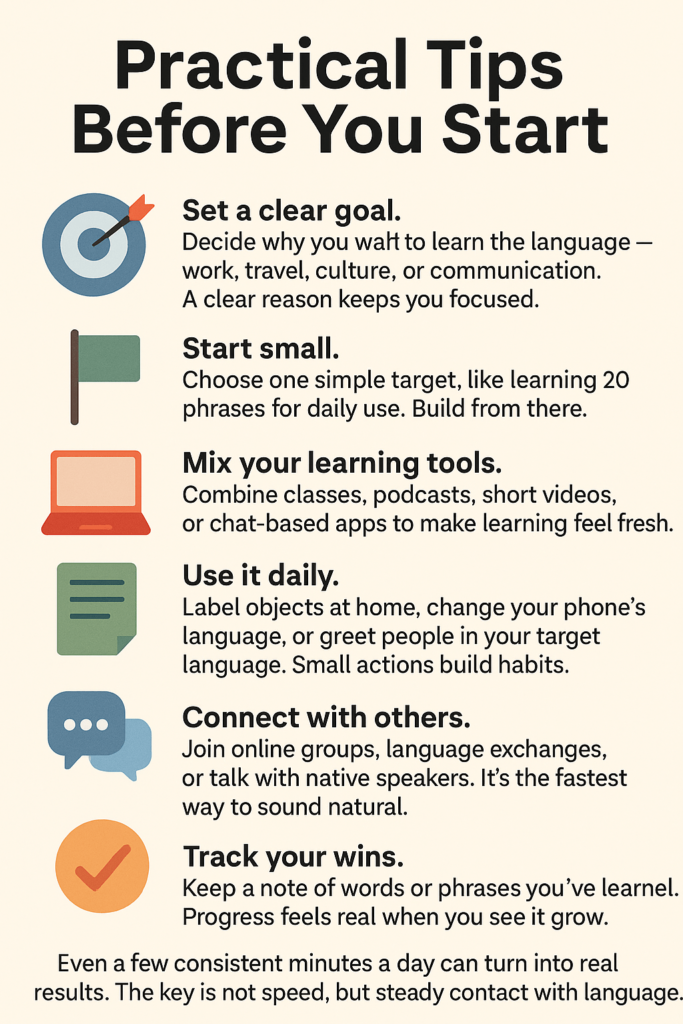
Also, think about what you can keep up with. Some languages take longer to learn. If your time is limited, start with one that feels easier or more familiar to learn a new language. Look at the resources you have, maybe your school offers classes, or you found a helpful app, or you know someone who can support you. When schoolwork gets tricky, having help can make a big difference. For example, the literature answer from AI can give clear and quick help with homework questions, making it easier to keep up and feel confident. Pick the language you will use the most. That way, it becomes part of your daily life, not just something to study.
Top Commonly Spoken Languages That Can Help
Some languages are easier to use every day. Others help you get more job options or talk to people in many countries. In 2025, it makes sense to focus on the most important languages that many people use and that work in real life. You don’t need to learn many languages, just one that fits your goals and that you will keep using. Below are six languages that stand out this year. Each one is useful in different ways. Some are good for travel, others for work or school. Some take longer to learn, but can help you for a long time.
| Language | Time to Learn | Speaker Count | Key Regions |
| Spanish | 600–750 hours | 595+ million | Latin America, Spain, U.S. |
| Mandarin | 2,200 hours | 1.3 billion | China, Taiwan, Singapore |
| French | 600 hours | 320+ million | France, Canada, parts of Africa |
| Arabic | 2,200 hours | 375+ million | Middle East, North Africa |
| German | 900 hours | 130+ million | Germany, Austria, Switzerland |
| Portuguese | 600 hours | 260+ million | Brazil, Portugal, Africa |
Spanish
Spanish is the official spoken language in many countries. It is also used often in the United States, especially in schools, hospitals, and customer service. You may hear it at work, in public offices, or on public transport. For many people, it’s a part of everyday life. You can find Spanish in many areas of daily life, on signs, public offices, schools, or in the media. If you have children, knowing the basics helps you support them or even help with Spanish homework.
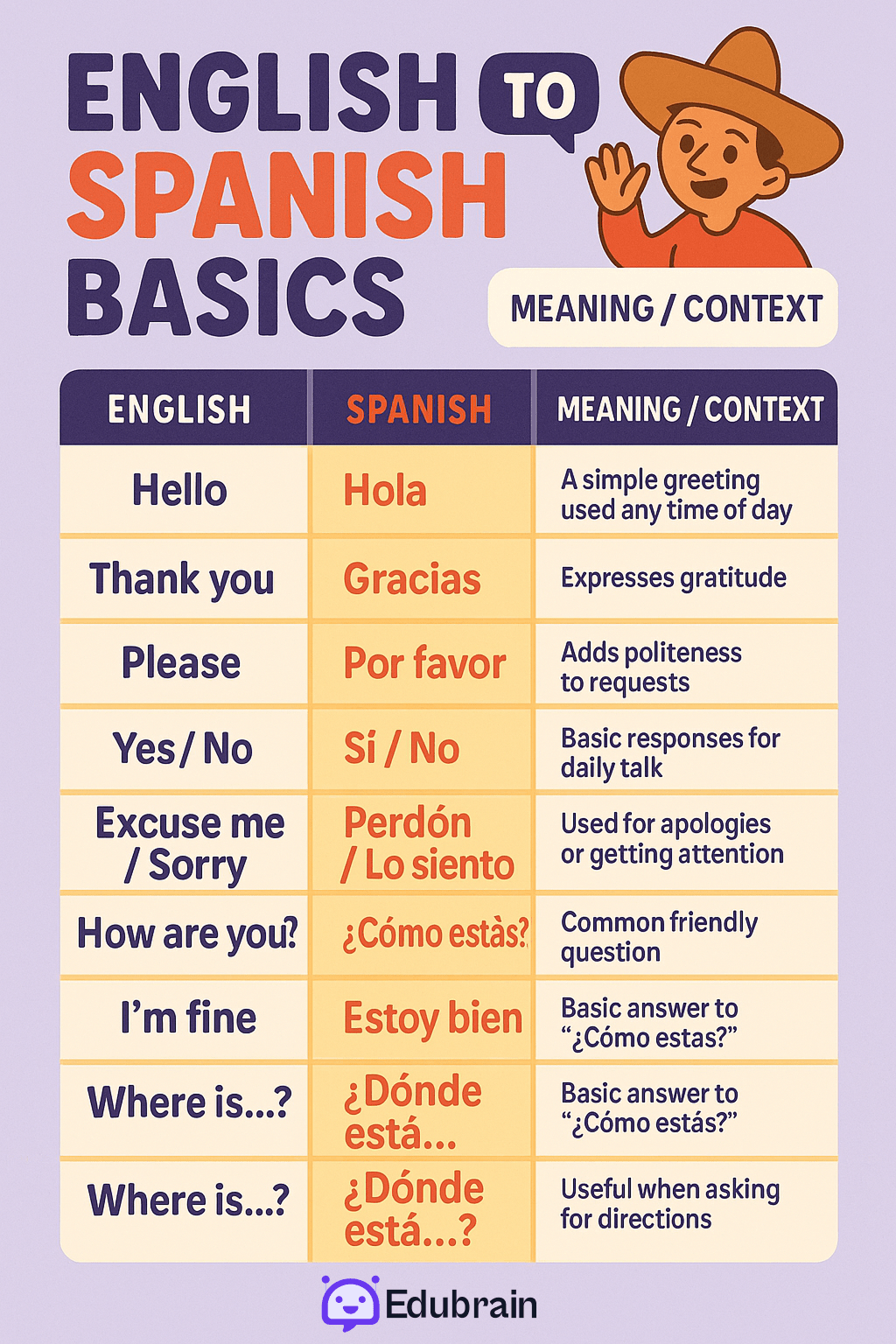
People use Spanish in healthcare, teaching, customer service, and social work. You also hear it in trade, law, and public offices. You don’t have to travel to use Spanish, it’s already part of life in many areas. If you often practice, you can learn enough to use it at work or around where you live.
Mandarin
Mandarin is the most used language worldwide. It is the dominant language in China, and it is also spoken in Taiwan and Singapore. Many businesses around the world are involved in trade, technology, and customer communication via Mandarin. Mandarin speakers are likely to be helped by having some basic understanding of words or phrases in Mandarin Chinese in case they have Chinese suppliers or clients.
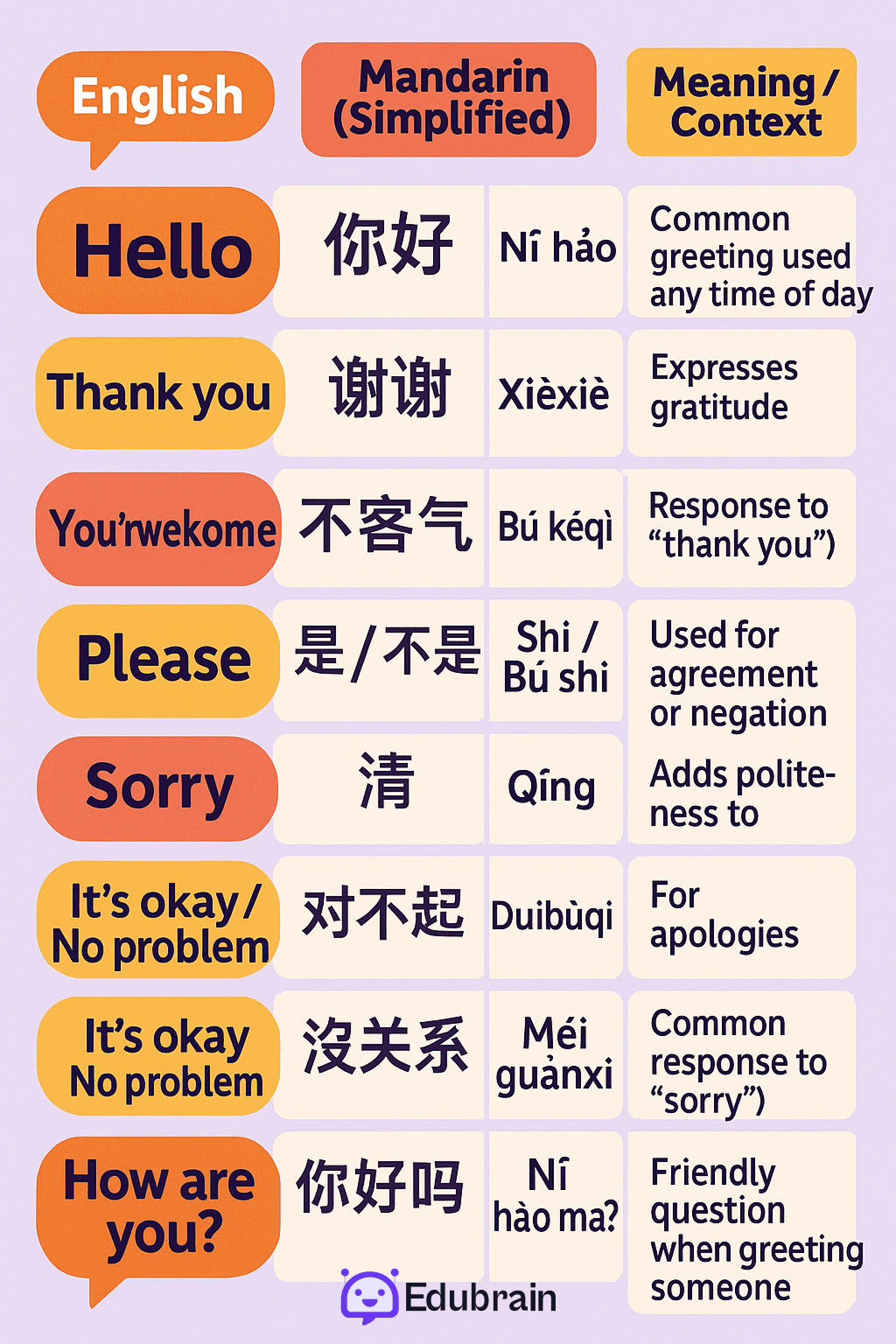
It is not a simple language to learn Mandarin. It contains tones and a writing system with characters rather than an alphabet. You do not, however, have to know them all. Simple reading requires approximated 2,000 characters. To begin with, apps, short videos, or beginner books are available. Mandarin is a good option when you have to work or plan to visit China.
French
You most likely already have some knowledge of French, as people study some elements of this language at school. French is spoken in some areas of North America, Africa, and Europe. Nations such as Senegal, Canada, and Belgium use it in their daily lives, workplaces, and learning institutions. Besides, it is present in such careers as international aid, law, and diplomacy.
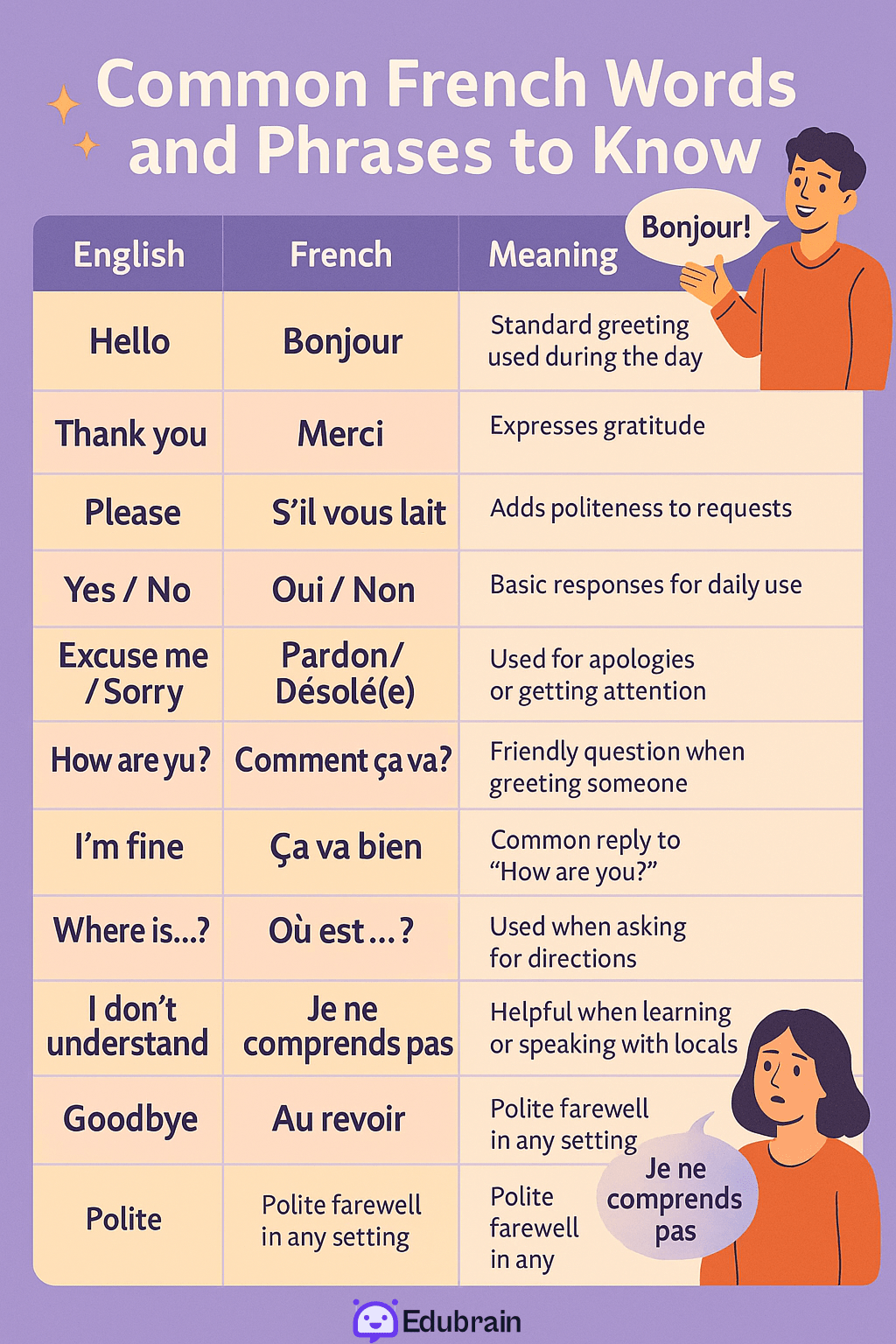
It will be easier to learn French when you already know how to speak Italian or Spanish due to the similarities of their grammatic and sentence structure. There is a good chance that many books, videos, and apps are at your disposal to support your learning, regardless of your location. Another good choice is French, in case you desire a language actively used in the world news, culture, or those fields of education.
Arabic
Much of the Arabic is shared in most countries in the Middle East and North Africa; thus, it is imperative to understand the Arab world. It is found in schools, in the news, and in the day-to-day life in Egypt, Jordan, Saudi Arabia, and Morocco. Arabic is required in some of the energy, security, translation, or international diplomacy positions. Arabic is of different types. The majority of individuals start with the Modern Standard Arabic, which is featured in books and news. Depending on the country, local versions of the language may sound quite different to each other. The text may seem strange at first sight, but it is possible to work on it step by step. Learning Arabic is hard, but it open doors to business, traveling, and working throughout the world.
German
German is the most spoken native language in Europe. It is used in Germany, Austria, and parts of Switzerland. Many science, engineering, and finance jobs prefer German, primarily if you work with European companies or partners. German is also often used in global business, research, and academic writing, providing professional opportunities. The grammar takes time to get used to, but there are good tools to help. EduBrain offers AI-based features to help with reading, listening, and building vocabulary step by step. You can set your pace and focus on the topics that matter to you. Even basic knowledge of German can be useful at work, in study programs, or when traveling in Europe.
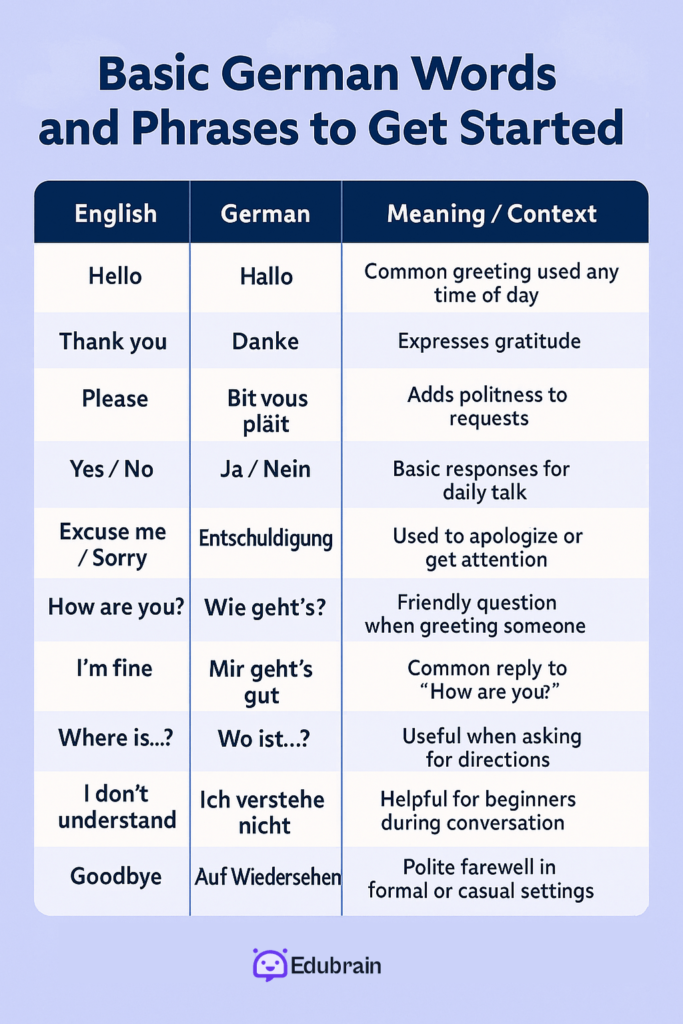
Portuguese
Portuguese is the official language in Brazil and is also used in Portugal and parts of Africa. Knowing Portuguese can be a key language if you work in trade, tourism, or education. Many companies do business with Brazil, so knowing Portuguese can be useful at work.
You do not have to be fluent to begin using it. In case you are familiar with Spanish, or French, then Portuguese can be more familiar to you, that is why it is the most suitable language to be learned next. Free tools such as videos, short stories, and audio lessons can be found online. Begin with words in common use and simple phrases. Basic knowledge will even be able to assist you to speak with other people, move with less challenges or even fit into a discussion at work or school.
Start the Right Way to Learn a New Language
It’s easier to make progress when you begin with a clear plan. You don’t need to study for hours or follow strict rules. What matters is finding a routine that fits your day and staying with it. Here are a few simple steps that help you choose the best language to learn :
- Focus on just one language. This helps you stay organized and avoid confusion.
- Ten minutes daily works better than one long session once a week.
- Read, listen, and speak. Changing tasks helps you remember more.
- You will get things wrong. That’s how progress happens.
- Learn what people use in real life, not just textbook terms.
If you want extra help while learning, using tools that give clear feedback and simple practice is useful. Some people need a way to build confidence without pressure or fixed lessons. One option is the English AI Helper, which helps you learn languages. It lets you practice short conversations, learn common phrases, and get quick responses based on your type. While it focuses on English, it also supports other languages if you want to work on something different. It’s a simple way to keep practicing every day without feeling overwhelmed.
Language Skills That Open Career Prospects
Learning a new language is not helpful only when it comes to travels or studies. It may lead to employment opportunities. Multilingual employees are sought after by many industries, including government, healthcare, education, technology, travel, and customer service. When entering new markets, some businesses require language proficiency. Others use it to better serve their communities.
Language proficiency is required for various jobs, including teaching, media, sales, and translation. It is also frequently necessary for international projects and public service. Basic information can have an impact. Multilingual individuals frequently receive greater responsibility and opportunities for advancement in their careers.
Final Thoughts
Now is the perfect time to begin learning a language. Don’t wait for the ideal moment or method to start. Choose a language that suits your needs and use it consistently. It will only get more difficult if you attempt to learn multiple languages at once. Do a little practice each day. Even a short period is beneficial. Sometimes it’s better to study a bit frequently than a lot. Honor minor accomplishments include picking up a new word or comprehending a sentence. Be patient because learning a language takes time. You will recover if you persist. Speaking a second language can benefit you in the workplace, on trips, and when interacting with new people. Take it one step at a time and begin today.
Explore Similar Topics
The background of chemistry influences almost everything from how we cook to how we use medicine. It is vital for...
Today’s students face a demanding academic world. The right tools can dramatically boost their success. These tools help simplify complex...

-
Unlimited AI homework help
-
A+ quality answers
-
Faster responses, no limits
-
Notes generator
-
Diagram generator
-
AI detector and humanizer
-
Ad-free experience
-
Share responses with others
-
Advanced reasoning
-
Unlimited slide generation for presentations
-
AI-designed, well-structured slide content
-
Faster workflow for bigger decks
-
Diagram Generator, Flashcard Maker, Notes Generator, Research Assistant, Answer Generator, AI Homework Helper & AI Detector
-
Discounted designer expert help
